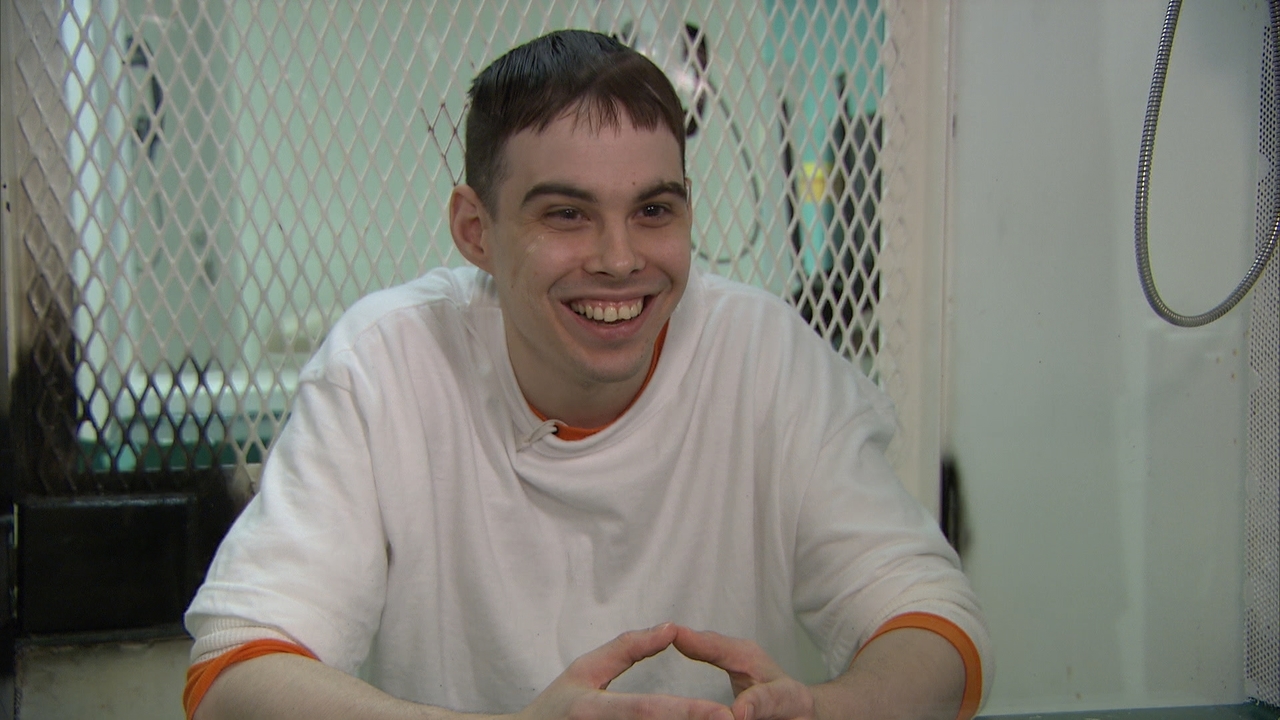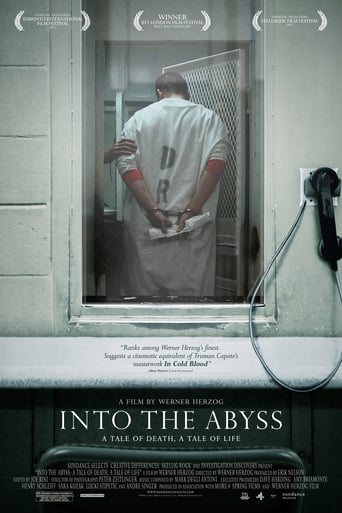

Filmmaker Werner Herzog does a documentary about Michael James Perry. He's on death row in Livingston, Texas scheduled to be executed in 8 days. He was convicted along with his friend Jason Burkett for a triple homicide. They killed a housewife in her home to steal a car and then killed two young people to get passcode for the community gate. This is not really a whodunit unless you believe Burkett or even Perry. It's not impossible to believe them and there are certainly people willing to do that. This is really about the whole society in general. It is about the victims. It is about the daughter who lost her family. It is about Burkett's father who watches his various family members get incarcerated along with him. It is about the friend and Herzog who is more interested in him learning to read as an adult. It is about the executioner who had to quit. This is quite a tapestry of Texan life.
... View MoreThis was a difficult one to gage. Let me just start by saying that I don't write many reviews (that will become clear. Gee, I bet you really want to keep reading now, don't you?) and when I do, they're films I'm split down the middle with - that I enjoy to a large degree but also have some problems with. So that's what I'm going to do now; discuss the main flaws as I saw them.The first 45 minutes or so of 'Into the Abyss' had me rather compelled, guiding us through the crimes themselves, preliminary interviews with those convicted, and really quite touching re-encounters with family members of the victims. A quite traditional introduction into matters of this nature, I thought. But it did take quite a detour and almost made a point to be unbiased. That may sound nonsensical - after all, documentaries are largely there to present us with untampered material and remain objective. However, other than interviews conducted with the deceased's families (namely Lisa Stolter-Balloun and Charles Richardson) and the Lieutenant, I didn't feel like there was really any support for the 'good guys.' You can call it documentation, you can call it rmeoving prejudice, you can call it Herzog doing his job as a filmmaker - but I had a hard time taking what this film gave me: an inherently sympathetic and empathetic viewer.I would have liked to have seen Herzog push some buttons with the more questionable individuals. I'm talking about Michael Perry and Jason Burkett - two guys who had some quite serious and detrimental cases going against them. Yes, I realise this documentary was not about that; whether they did or didn't do it. Alongside other interviewees, it served more as a platform to discuss capital punishment and how lives can go wayward from poor upbringings and whatnot. But that just didn't make for particularly riveting or insightful conversation, to me. It was intriguing enough, and held that throughout, however had few flashes of real emotional depth that you would expect in a case like this - particularly with Perry and Burkett. Often times, Herzog would strike up what I can only call small talk that felt out of place and actually kind of insulting. I can appreciate the mindset behind that (either it's to ease tension or it's Herzog being Herzog) but am of the opinion that such trivial chatter is unnecessary and even impolite in some instances. Maybe that's all just my warped perception, though.Herzog ending the film with a nod to the "families of the victims of violent crime" admittedly left a bad taste in my mouth. Not that I think those affected don't deserve the recognition and dedication - they absolutely do - but I would not have thought it to be that simple from this particular project. Apparent as it may have been that Herzog was against the death penalty (he directly addressed this very early on), he made no mention of it in writing at the film's closing? No facts about how many people had been put to death in the most recent year, or anything relating to that? Nothing? Without that, I cannot help but feel the dedication Herzog decided upon was more for show and as a tool of faux-support. Nice of him to put it in there but it just seemed a little forced and loose-ended when he didn't follow it up with or acknowledge the very same capital punishment system that he clearly feels strongly about.6/10
... View More"Into the Abyss," is a documentary film by Werner Herzog, about a young man sitting on Texas's deathrow, awaiting execution for killing a woman and 2 other young men so that they could steal a car.This is a clear propaganda piece by Herzog where he tries to draw attention to the left-wing ideal of getting rid of the death penalty. The fact is he continued paint the picture of boys from the wrong side of the tracks, who only committed murder because of their poor upbringing, lack of education, and American gun owning society. One interview he even pushed someone from the town to go on about his lack of education and the fact that until recently learned how to read. Come on Herzog! Not being able to read doesn't have any effect on knowing what is right or wrong.Then he went on to talk to a former bar employee who knew the murderers and even road in the stolen vehicle, and it was clear that the only footage he wanted was the part where she said that over the years she saw a lot of bad things happen. He also interviews one of the fathers of the murderers who is also serving a sentence for murder. Herzog gets the father to weave a tale about his failings as a father and that was the cause of all this. Notice also I did not mention anyone of the killers because a triple murder does not deserve to ever be mentioned!This is clearly a hard left-wing, social democrat push vehicle. It is an attempt to show how horrible the U.S. is, our education system, our gun rights. It does everything leftists and socialists always do, They try to paint everyone as a victim, and shouldn't have to face any responsibility for anything. The fact is a life sentence is much more of a cruel and unusual punishment than the death penalty, and what people forget is that the U.S. became the superpower it is BECAUSE we don't follow in the footsteps of Europe's Left leaning policies.All in all, this is a contrite, transparent, and condescending documentary. I am sure Werner Herzog got plenty of pats on the back for his effort, but next time he should stay and do more documentaries in and around Europe. 2 out of 10
... View More"Into the Abyss", a documentary by Werner Herzog, tells the tale of Michael James Perry and James Aaron Burkett, two teenagers responsible for murdering Texas housewife Sandra Stotler. They wanted the keys to her car. She lived in a gated community. They lived outside. The film's subtitled "A Tale of Death, a Tale of Life", partly because Perry was sentenced to death whilst Burkett was given life imprisonment, partly because Herzog is interested in how the social conditions of these two young men – their lives – resulted in them becoming avatars of death.Burkett's father, also serving a life sentence, is himself responsible for getting his son off the death penalty. He tells his son's jurors a sad tale in which he blames himself and his life decisions for essentially "forging" his son into a murderer. Herzog's film is similarly preoccupied with questions of social conditioning, determinism, free-will and indeterminism; how accountable are these two boys? The film is bookended by men of faith. It opens on Texan chaplain who accompanies prisoners to the lethal injection chair. Herzog surrounds the man with gravestones and unclaimed bodies. The film ends with the moving testimony of Fred Allen. A death row executioner, Fred resigned after 120 executions. He couldn't take the grim morbidity of it all. We later learn that Texas governor George Bush, America's favourite war criminal, executed a record breaking 152 men. Allen says he's learnt to live for the "dash" - that line between the birth and death dates on one's gravestone.Herzog interviews the killers. While he sympathises with them, he outright states to the camera that he doesn't like one; the kid's dangerous. Trust Herzog's instincts. Other interviews are conducted with family members and two relatives of Sarah. Interestingly, Burkett's girlfriend was inseminated by him whilst he was in jail. Herzog recognises her instantly as a death-row groupie. She's a hybristophiliac. A person who's sexually aroused and attracted to people who have committed cruel, gruesome crimes. Hybristophilia, a very rare paraphilia, occurs more frequently in women than men. Herzog picks up on certain traits right away, but avoids offending the woman. It's clear she has rescue fantasies, is delusional and is perhaps a narcissistic enabler, attracted to power or was perhaps abused in the past. Herzog doesn't pry. Hybristophiliacs are drawn to fame and notoriety. Biologists, using tests with monkeys, say some are attracted to the perceived masculinity of violence. Whatever the truth, like everyone else in "Abyss", this character hints at dark baggage.The film strongly resembles Truman Capote's "In Cold Blood", but is less focused, more shapeless and is ultimately one of Herzog weaker documentaries. It's largely a routine picture, but Herzog does finds some nice visuals here and there, like a brief shot of a tree growing up through an abandoned car; Nature finds a way, manages to penetrate everything, leaving behind wreckage. Other scenes are extremely touching. Consider one in which a chaplain likens the preciousness of life to the ease at which a squirrel may be run over by a car. One bad choice, one mistake, and life, so very fragile, quickly goes off the tracks. The "abyss" of the film's title conjures up a range of meanings. Perhaps it refers to the dark void of death, the horror of murder (state sanctioned or otherwise), the cavernous Texan execution chambers, or perhaps the tough, hopeless conditions of subterranean Texas, a breeding ground for crime. Elsewhere it's clear that Herzog is leading this documentary toward his very own, rigid aims. More fiction than documentary, Herzog has the ability to almost will or lead those he interviews into saying exactly what he wants. Observe early scenes in which Herzog speaks about unclaimed bodies and how effortlessly he gets characters to imply for him that social dysfunction perpetuates itself. It's an arrow aimed at the very God these Texans proudly adhere to: there is no "divinity" allowing these men to die, just men.With his distinct Bavarian drawl and incessant metaphysical musings, Herzog's long become a parody of himself. You've got to love him, though. This is a guy who manages to turn drunk penguins and dancing chickens into existential statements. In "Into the Abyss" he matter-of-factly looks at a prison chaplain and says "tell me about an encounter with a squirrel", as though this sentence is a perfectly ordinary. In Herzog's defence, such odd lines of enquiry are designed to tease out the absurd and do often lead interesting places. What emerges in "Into the Abyss" is less a condemnation of the death penalty than a condemnation of a society which engenders cross-generational suffering and breeds social dysfunction. Like the squirrel's food, it's all very nuts.7.9/10 - Very weak Herzog, but with 3 powerful sequences. Worth one viewing.
... View More